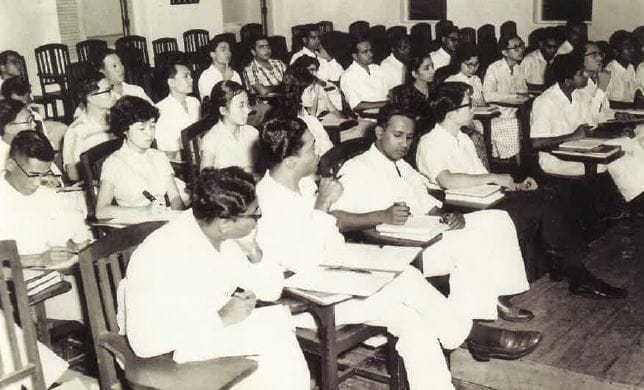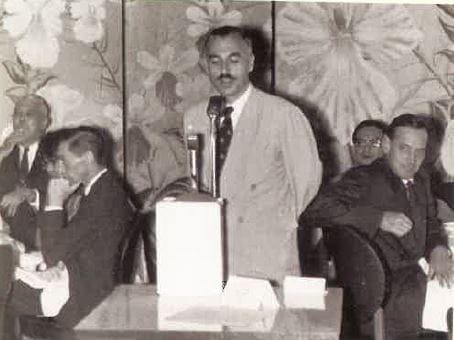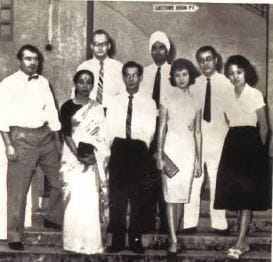
A Class Act: How Singapore’s First Law Faculty Came To Be
Students across the country have begun the academic year in earnest. SAL marks the occasion with a look at the history of Singapore’s law faculty which took root at the then-University of Malaya. It started in 1959 with barely three academic staff: Dean Professor LA Sheridan, Mr B L Chua and Mr Tan Boon Teik, a magistrate who taught part-time. Mr Tan Boon Teik, who would later become Singapore’s longest serving Attorney-General, continued to teach part-time at the faculty for many years. His wife, Professor Tan Sook Yee, would became the faculty’s 10th Dean in 1980. This two-part series is based on SAL's oral history interviews with former deans Prof Sheridan and Prof Tan Sook Yee. They recount the nascent years of the law faculty and their love of teaching which have nurtured many legal illuminaries who have made their mark in Singapore and overseas.
It wasn’t always a given that a law degree from a Singapore university would be recognised as a qualification for one to practise law. The pioneer batch of students from the first law faculty did not have that assurance until their third year.
Prof Sheridan who arrived in Singapore in July 1956 had just 14 months to set up the law school and get that recognition from the Bar. He managed to do the first but getting the Bar to agree that a local degree was just as good as one from the UK or Ireland (the only two places then where one could qualify as a lawyer) was more challenging.

With about half the students coming from Singapore and the rest from what was then the Federation of Malaya, Prof Sheridan remembered having to spend a lot of time crossing the Causeway to negotiate with the State Bar Committees. Sir Roland Braddell from Kuala Lumpur was for the idea of a local law school and there was also strong support from Mr Lee Kuan Yew and Mr David Marshall. But as Prof Sheridan recalled, “Some of the members of the Bar, not just Europeans, took the view that you couldn’t get decent training outside the British Isles.” The task to win over these “doubters is more difficult when you haven’t got a law faculty to show them. You’re only talking about something that’s going to happen in the future.”
Despite that, the faculty opened its doors wide and invited applications for full-time and part-time students as well as those from the Chinese stream.
Radio Law
Many of the thousands who applied were drawn to the profession by Radio Law, a broadcast of lectures and a panel discussion with guests from the legal profession, among them Mr Lee Kuan Yew. Prof Sheridan who planned the broadcasts was amazed at the “astonishing success in terms of listener numbers”.
Mr TPB Menon who was among the first batch of law students at the faculty was fascinated by the talks. “We had no TV, nothing in the evenings so I used to listen to this Radio Law. They will set papers for you to write and I used to go and do research…” Mr Menon’s classmate, Emeritus Prof Koh Kheng Lian, was among the 50 who submitted the best essays and won a trip to Kuala Lumpur for a seminar.
Coping with the first year

“The biggest enterprise was to get a law library together,” recalled Prof Sheridan. The other big challenge was coping with the overwhelming demand for part-time legal education. The faculty admitted 140 of the 150 applicants for the part-time course. “It was a revolutionary idea to let people in without entry qualifications and I certainly wouldn’t have contemplated doing it for the ordinary undergraduate, non-mature student. A very large number of them did fail the first-year examinations but the ones who passed included some very bright people.”
“But in terms of the administrative and teaching load, it brought us close to breaking point,” recalled Prof Sheridan. The faculty employed a large number of part-time tutors and reorganised the time-table so that lectures were held in the evenings in order for both full-time and part-time students to attend.
Teaching style
If Prof Sheridan’s recruitment of students was revolutionary, his teaching methods were just as much ahead of its day. “I made myself tremendously unpopular with the students by demanding that they talk in… lectures as well in tutorials. They were supposed to come prepared to discuss cases. I wasn’t going to cite cases in the lecture and then let them go away and not read them afterwards…They found it very intimidating [but] they appreciated it 10 years after they graduated.”
First-year students were terrorised by this novel teaching style. “He would come to the tutorial [and] there would be 30 cases on the table and you just had a dialogue with him… And if you had got nothing to ask him, he would just leave the room,” remembered Mr Menon. One classmate, former Solicitor-General Koh Eng Tian, recalled that this method of teaching was especially tough when it came to preparing for exams. “Since he gave no lectures and did not highlight topics that we ought to know thoroughly, we simply had no idea what would come out in the exams.”
Despite this, his students remember him as an extraordinary teacher and a good friend. Professor Tommy Koh has fond memories of Prof Sheridan inviting his students to his home for dinner every month to meet leading members of the Bar. “So when I myself became a teacher and Dean, I continued that tradition,” said Prof Koh.
Listen to:
- Prof Sheridan’s oral history interview in full here.
- Mr TPB Menon’s oral history interview in full here.
- Prof Tommy Koh’s oral history interview in full here.
- Mr Koh Eng Tian’s oral history interview in full here.
The Development of The Singapore Legal System is a joint oral history project by SAL’s Legal Heritage Committee and the Oral History Centre, National Archives of Singapore. All images are reproduced from Scales of Gold: 50 Years of Legal Education at the NUS Faculty of Law.
A LIFE IN THE LAW
Professor L A Sheridan
Professor Lionel Astor Sheridan was the first Professor of Law in the University of Malaya in July 1956. The law school was initially a department under the Economics and Social Studies faculty before it was given full faculty status in 1959. Prof Sheridan was unanimously elected its first Dean and Head of Department. He resigned in October 1962 to take up a chair in Comparative Law at the Queen’s University in Belfast. In 1971, he founded the law faculty at University College, Cardiff where he remained till the end of his academic career and was made Emeritus Professor.

